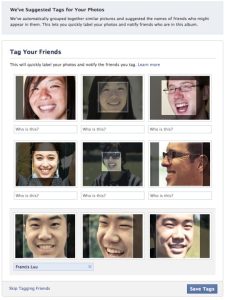![]() Ever since Facebook started rolling out its facial recognition service — officially “Tag Suggestions” — a few months ago, pictures have been getting tagged with the names of the people who are in them, without their permission and even without their knowledge.
Ever since Facebook started rolling out its facial recognition service — officially “Tag Suggestions” — a few months ago, pictures have been getting tagged with the names of the people who are in them, without their permission and even without their knowledge.
As you might imagine, this is causing an outcry about the privacy implications. Last week, just days after Facebook extended its facial recognition to Europe and other countries, a group of privacy organizations filed a complaint with the Federal Trade Commission. One of the issues is that Facebook requires users to opt-out rather than opt-in to the service. The bigger part, however, is over what data Facebook is collecting and how it will be used.
European Union regulators raised the alarm last week, and now some in Congress are complaining about Facebook’s implementation.
Facebook’s response? “We should have been more clear with people during the roll-out process when this became available to them.” To be fair to Facebook, the service has been around for months in the U.S. without much complaint. But a Sophos blog post complained that it was turned on for users elsewhere without any notification, and that the default is on.
However it all ultimately shakes out, HR professionals should consider the implications of being able to see — not just read — what their corporate friends have been up to.
First, some history.
 Recruiters use Facebook to background prospects, despite the many cautions about doing so. The issues range from potential EEOC problems to the very reliability of the information. ERE writer Raghav Singh, a partner in a staffing firm, noted last year that “virtually everything seen online is unstructured and from sources of unknown credibility.”
Recruiters use Facebook to background prospects, despite the many cautions about doing so. The issues range from potential EEOC problems to the very reliability of the information. ERE writer Raghav Singh, a partner in a staffing firm, noted last year that “virtually everything seen online is unstructured and from sources of unknown credibility.”
Nonetheless, as the survey he cites notes, “84 percent of U.S. recruiters think it is proper to consider personal data posted online when evaluating a candidate.”
So no surprise that career counselors warn college students about their online socializing. They’ve been warned so often and for so long that their Facebook (and before that, MySpace) pictures and posts can hurt their job prospects, that anyone who doesn’t know isn’t listening. Two years ago a Zdnet article put it bluntly: “Are drunk Facebook photos killing your job prospects?”
Now, the facial recognition technology is kicking the problem up more than a notch. Instead of posting and tagging a picture at a time — a laborious chore if you have multiple pictures with multiple people in each — Facebook will now scan the new photos and suggest names for each person it can identify. With a single click, one picture or 100 can be tagged.
It only suggests names of your Facebook friends, so business sites (Pages, in Facebook parlance) with fans aren’t as directly affected by the facial recognition service as are the personal sites. However, that doesn’t mean they aren’t affected.
Since last month “people have the ability to tag Pages in their photos on Facebook in the same way they can tag their friends.” People who are tagged in those pictures become visible to those who visit the business site.
To make clear what this means: Someone uploads a picture and tags it to a business Facebook site. The picture is now visible on the business’ page, along with the tags of anyone in the picture.
Should the picture be of a career open house, showing the candidates, including some from the crosstown competitor, the potential for mischief is clear.
When it comes to the personal pages of recruiters who have crated accounts for pipeline purposes, tagged pictures of their “friends” offer a mosaic of the activities of individuals in their network, whether or not they are even aware of it.
Admittedly, this is not a new situation. Picture tagging has been available for a while. But now that Pages (business profiles) can be tagged in pictures, and facial recognition enables one-click tagging of multiple images, the door has swung open pretty wide. Besides the career fair example above, it doesn’t take too much imagination to see what other implications there might be. The annual company picnic or holiday party come to mind.
Yes, people can delete the tags. And they can opt out of having Facebook automatically suggest their name to a picture owner (though the person can still manually enter their name). Search Engine Watch details how to opt-out.
It’s a little more problematic for businesses, since being tagged in a photo has branding value. But that means living with some pictures you might rather not have appear on your site.
Some control is in the hands of the photo poster, who can choose to make the picture viewable by everyone, which means it appears publicly on the photos tab of the business’s Facebook pages, or viewable just by their friends.
Administrators can disable tagged photos from appearing by managing the settings. Then, no user photos will appear.